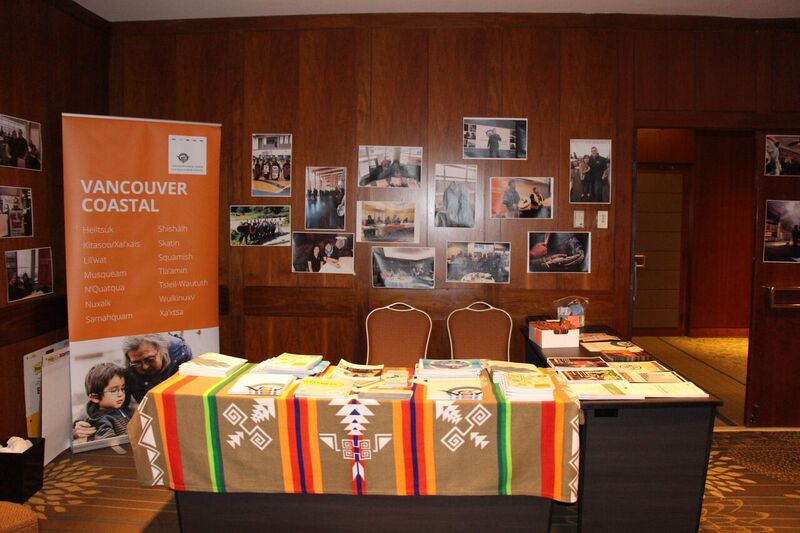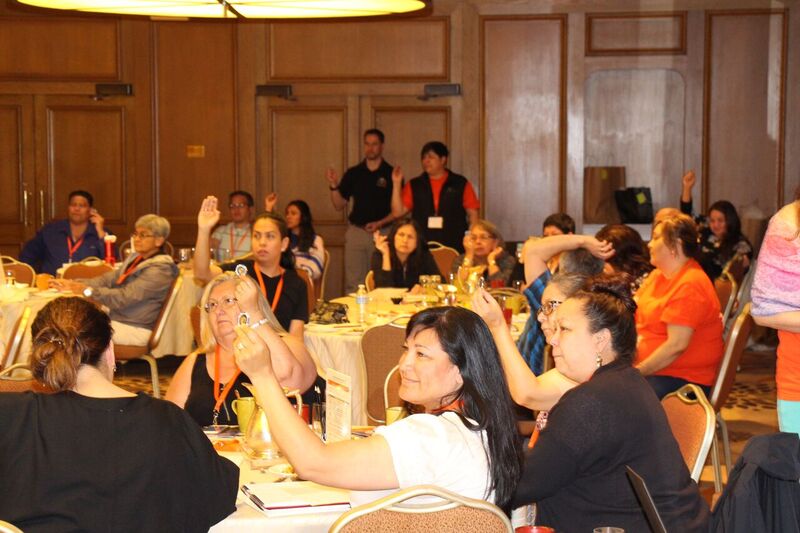
From April 24-26, political and health leads, Elders, youth and regional staff gathered in Vancouver for the Vancouver Coastal Regional Caucus. Five Chiefs, 18 technical health leads, and eight proxies attended the forum for discussions on health service updates and transformation, ongoing partnerships, and governance.
Coordination lead for the Coastal Wolfpack and member of the Musqueam Nation Alec Dan provided a welcome to the territory and song to acknowledge the honoured guests and the important work they had to do.
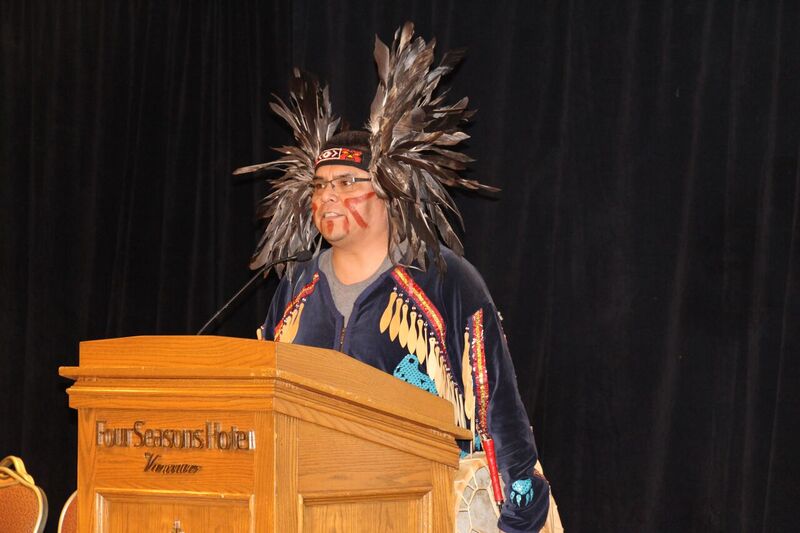
"You have travelled here and I pray that you will keep an open heart and open mind," shared Alec Dan, as he opened the Spring 2018 Caucus in a good way.
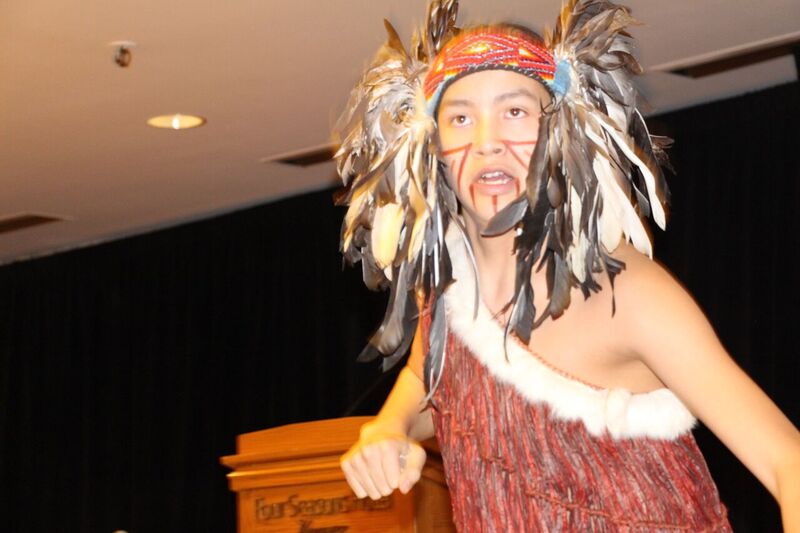
Maria Martin, Central Coast Representative for the First Nations Health Council, chaired the event and provided some opening words. The agenda was adopted by delegates.
Ensuring No Community is Left Behind
On day one, First Nations Health Authority (FNHA) provided updates on health programs and services. FNHA Chief Operating Officer Richard Jock presented budget highlights for 2018 and highlighted the BC government's compliance with the UNDRIP, TRC calls to action and commitments that arise from the recognitions of rights as reflected in Tsilhqot'in. He also highlighted, at the provincial level, new investments in team-based care. "This is a real opportunity, but it will be important that we are effective in working with the Ministry of Health, regional health authorities and the Doctors of BC," he said.
He also highlighted the guiding principles behind FNHA's funding allocations and noted the difference in escalator funding today as compared to Heath Canada funding. He noted that it's important as we go forward to leave no community behind and that for this year FNHA will continue to match the federal rate and allocate additional funding on a needs base. The allocations will look at population growth which hasn't been done in the past.
Text polling was used to engage the caucus participants on regional priorities. The top three priorities identified were:
• Addictions workers
• Home Care Resources
• Nursing Increases
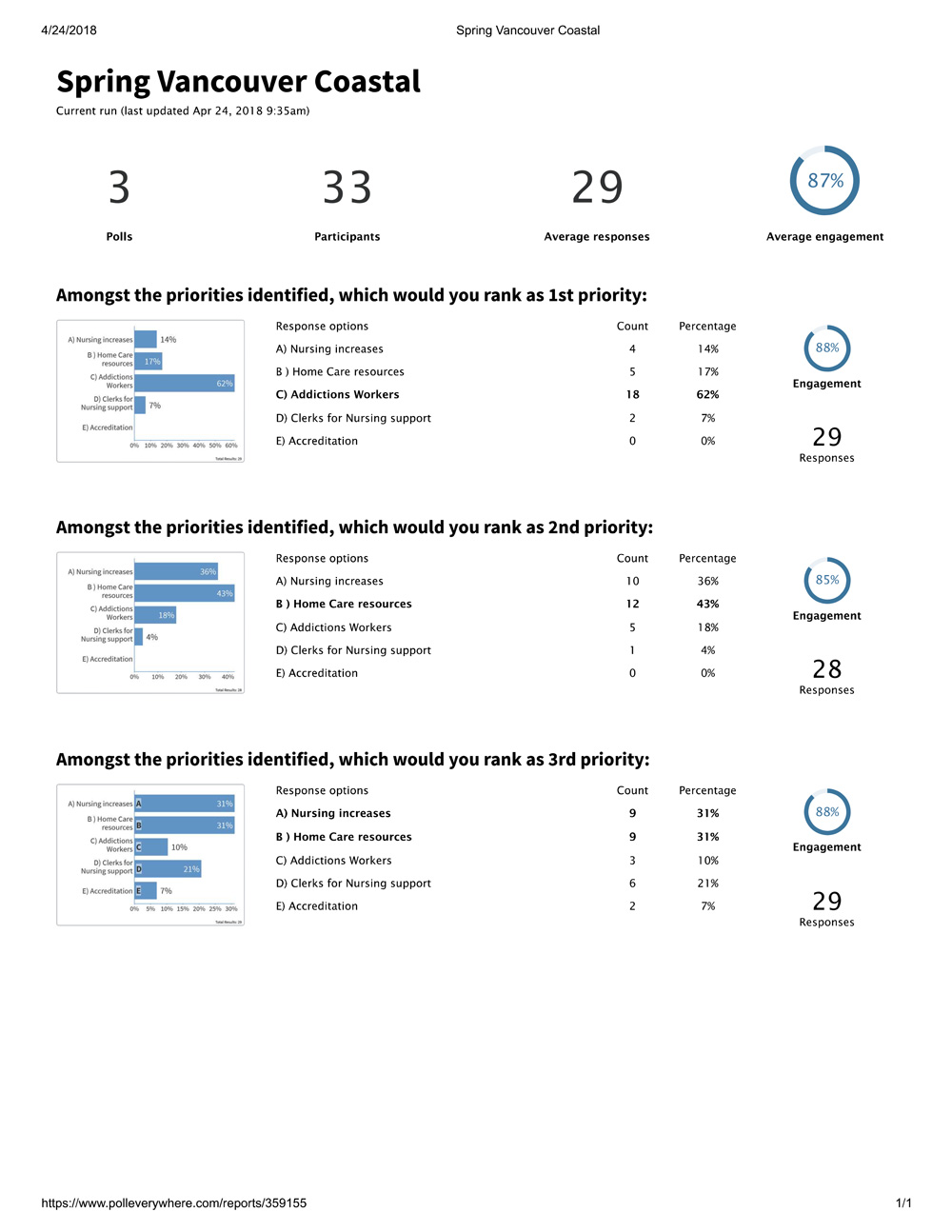
Health Benefits Plan W and the Next Phase in Transformation
Darren McKnight, FNHA Director of Health Benefits Management, presented on the transition to Plan W under Pharmacare. He highlighted that this is the time to reflect on what we've learned and utilize those lessons in the next engagement plan.
He noted that there have been some challenges and encouraged the group to contact FNHA should they encounter problems with prescriptions. Furthermore, he acknowledged that communication and communication with clients living away from home will be improved moving forward and that FNHA is committed to doing better. He also noted the need for change champions within communities as we prepare for phase two – the transition to dental, vision and medical supplies and equipment from the federal NIHB program. Darren shared that he is building a Community Relations Team to be the voice, eyes and ears of health benefits in communities.
Community Wellness Services and Support for the Overdose Crisis
FNHA Vice President of Programs and Services, Sonia Isaac-Mann presented on the policy statement on Mental Health and Wellness and the foundations and direction that guided its development. She covered past, present and future services and highlighted the expansion of services since transfer five years ago. She presented on Jordan's Principle and what has changed since FNHA took responsibility for Jordan's Principle cases in BC. She presented current Jordan's Principle statistics including that there have been 286 claims to date. She provided information on how to make a Jordan's Principle claim and walked the group through the process.
Acting Chief Medical Officer, Dr. Shannon McDonald
Acting Chief Medical Officer Dr. Shannon McDonald discussed the overdose crisis and covered FNHA's framework for action. "I offer my condolences to those communities who have lost love ones due to this crisis," she said. "We need to talk about this, we need to be loving and supportive to each other. We have to talk to our neighbours, families and community members about this."
She asked the group for a show of hands on how many people had taken Naloxone training. She was pleased when well over half of those present raised their hands. She expanded on FNHA's overdose/opioid response and highlighted take-home Naloxone training and increasing access to Opioid Agonist Therapy (OAT) in rural and remote communities. She went on to share about 55 Indigenous Harm Reduction Projects that are currently being funded.
Cassandra Puckett presented on the regional response to the overdose emergency, which includes participation in the Urban Indigenous Opioid Task Force. "The antidote to addiction is connection," she noted, before covering the region's awareness efforts including Town Halls and Health Fairs, and initiatives like the take-home Naloxone training. Regional action also includes creating an accessible range of treatment options including Mobile Mental Wellness/Detox team models.
Dr. Mark Lysyshyn, Medical Health Officer with the Vancouver Coastal Health Authority, presented on the impact of the overdose crisis and the priority actions and interventions in the Vancouver Coastal Region. He highlighted Urban Aboriginal partnerships and First Nations community partnerships. He then posed to the group, "What else should we be doing together to keep Aboriginal people safe and healthy in the VCH region?"
Vancouver Coastal Regional Team Update
Acting Director for FNHA Vancouver Coastal Region Naomi Williams opened her presentation with an acknowledgement of the Squamish, Tsleil-Waututh and Musqueam Nations for allowing FNHA to conduct its work on their territories.
Naomi presented the Looking Back to Shape Our Work Forward summary of the 2018 sub- regional gatherings and emphasized that it reflects the collective progress of the regional health and wellness journey while honouring the sub-regional family voices. She then went over the current draft of the Urban Aboriginal Health Strategy and the engagement and approval pathway to date. "It has taken us six years, and in that dialogue there have been a lot of rich discussions, but our organizations have evolved, she said."
She presented on the 2018 Renewal of the Vancouver Coastal Partnership Accord and invited the participants to take part in a survey that will inform the approval pathway and a subsequent report.
During the question and answer session, leadership expressed appreciation for the work of the regional team and asked questions about the availability of nasal naloxone for communities.
Partners Commit to Ongoing Support
Leslie Bonshor, Executive Advisor for Aboriginal Health for VCH, presented an update from the Aboriginal Health team from VCH to provide insight into the upcoming work. She covered some of the Downtown Eastside (DTES) initiatives, including anti-stigma projects, a new DTES Aboriginal Healing & Wellness Space and an initiative supporting Aboriginal women.
She shared strategic updates from her portfolio including the Elders circle, urban and housing initiatives and primary health care expansion.
Tanis Evans from Vancouver Coastal Health Community of Care Operations team presented on First Nations Health Governance on the central coast. She updated delegates on Emergency planning, Intensive case management, and the Collaborative Services Committee that is currently in the conceptual stage.
Day Two: Discussing Social Determinants of Health and Mental Health and Wellness
On day two of Caucus, Kim Brooks, President of the First Nations Health Directors Association (FNHDA) and Rosemary Stager, Health Director for Southern St'at'imc opened the day by presenting on the FNHDA perspectives on the social determinants of health.
Kim and Rosemary emphasized the need to address all factors that contribute to an individual's and community's health.
Leadership discussed gaps that exist for clients who are seeking treatment and have to attend counselling or wait to get in. Many leaders also suggested alternative places for these communities members to go to connect to culture and land.
Social Determinants of Health Strategy
Grand Chief Doug Kelly presented on the Social Determinants of Health Strategy, beginning with a reflection on the strong history of First Nations wellness: "It was not that long ago that our ancestors were taking care of the land and taking care of the people; it was not that long ago that our Elders and medicine people taught our children our Nations ethics, beliefs, our laws and prayers—Teachings to take care of the land and take care of one another."
He emphasized the importance of healing the people before rebuilding Nations, to get to a place to have Nation-to-Nation relationships. "When we talk about Nation rebuilding we know we need to talk about housing, environment, culture and so on."
Social development leaders expressed that children continue to fall through the cracks and that there is a need for governance arrangements with the Ministry of Children and Families and a table to work out the problems together. Chief Kelly encouraged communities to include this issue in their Regional Health and Wellness Plans so that the FNHC can help.
One leader shared that "Our people have been managing change since time immemorial" and that we need to approach this work leaning on principles from our traditional teachings.
Leadership emphasized the importance of the FNHC continuing to engage and visit community leadership as they move forward with their work as facilitators and political advocates.
Mental Health and Wellness Priorities: Traditional Wellness, Culture and Prevention
Naomi Williams outlined new opportunities and the feedback that was gathered at sub-regional sessions. Themes included focus on traditional wellness, culture and prevention, new and improved service design and community-driven mental health and wellness strategies.
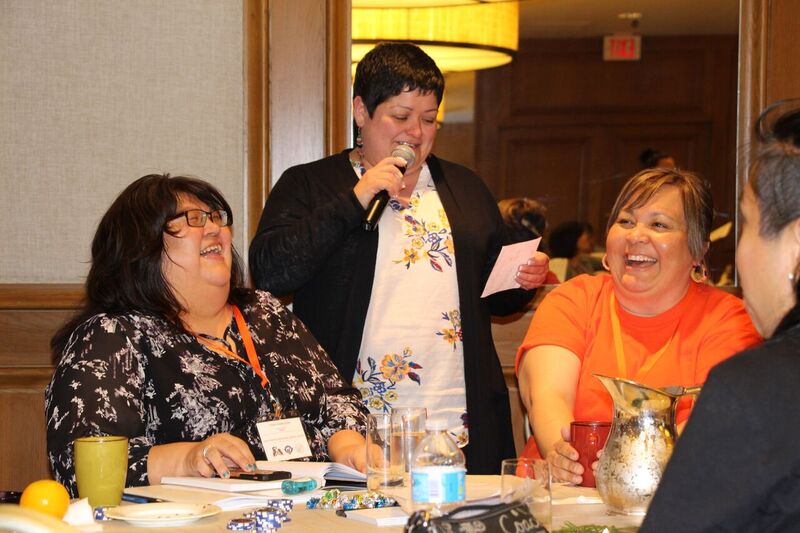
Caucus attendees then took part in a tabletop dialogue session on the FNHC's proposal on Mental Health and Wellness. Sub-regions engaged in dialogue and identified key investment priorities for Mental Health and Wellness, before engaging in discussion on ways to allocate funding. "We had an honest conversation with each other about the healing that needs to take place between our Nations as we went through this exercise," shared one Health Director.
On the final day, attendees participated in a Nation-Based governance dialogue and received an update on social determinants of health. Tables reviewed the Vancouver Coastal Regional Report on the social determinants of health and discussed and provided text feedback on "What is next for the Coastal Caucus and what are the tools and resources needed?"
